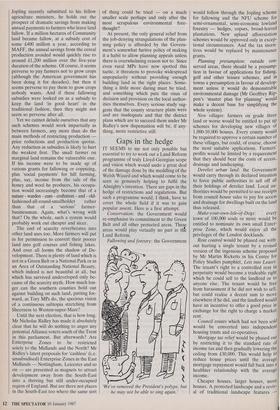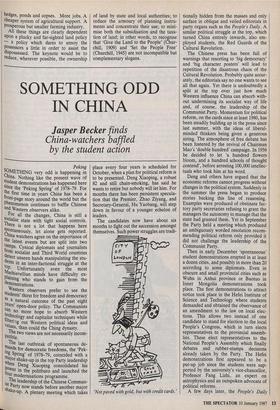Gaps in the hedge
IT SEEMS to me not only possible but essential to try to work out a Land Reform programme of truly Lloyd-Georgian scope and vision which would undo a great deal of the damage done by the meddling of the Welsh Wizard and which would come to be seen as genuinely helping to fulfil the Almighty's intention. There are gaps in the hedge of restrictions and regulations. But such a programme would, I think, have to cover the whole field if it was to gain popular assent. Here is a first attempt.
Conservation: the Government would re-emphasise its commitment to the Green Belt and all other protected areas. These areas would play virtually no part in the Land Reform.
Fallowing and forestry: the Government 'We've removed the President's polyps, he may not be able to sing again.' would follow through the Jopling scheme for fallowing and the NFU scheme for semi-ornamental, semi-economic lowland forestry — hedges, copses, broad-leaved plantations. New upland afforestation schemes would be approved only in excep- tional circumstances. And the tax incen- tives would be replaced by maintenance grants.
Planning presumption: outside con- served areas, there should be a presump- tion in favour of applications for fishing, golf and other leisure schemes, and in towns a presumption in favour of develop- ment unless it would do demonstrable environmental damage (Mr Geoffrey Rip- pon's 'master plan for planning' would make a decent base for simplifying the whole system).
New villages: farmers on grade three land or worse would be entitled to put UP schemes for developing new villages of 1,000-10,000 houses. Every county would be required to approve a certain number of these villages, but could, of course, choose the most suitable applications. Farmers' profits would be limited by a requirement that they should bear the costs of access, drainage and landscaping. Derelict urban land: the Government would carry through its declared intention to force public authorities to sell off all their holdings of derelict land. Local au- thorities would be permitted to use receipts from council house sales to pay for access and drainage for dwellings built on the land thus released.
Make-your-own-Isle-4-Dogs: every town of 100,000 souls or more would be entitled to nominate its own small Enter- prise Zone, which would enjoy all the privileges of the London docklands.
Rent control would be phased out with- out hurting a single tenant by a revised version of the ingenious scheme proposed by Mr Martin Ricketts in his Centre for Policy Studies pamphlet, Lets into Leases. The tenant's right to a controlled rent in perpetuity would become a tradeable right which he could sell to the landlord or to anyone else. The tenant would be free from harassment if he did not wish to sell, but could realise a decent sum to move elsewhere if he did, and the landlord would have an incentive to offer a good price in exchange for the right to charge a market rent.. Council estates which had not been sold would be converted into independent housing trusts and co-operatives.
Mortgage tax relief would be phased out by restricting it to the standard rate of income tax and then gradually lowering the ceiling from £30,000. This would help to reduce house prices until the average mortgage repayment would fall back into a healthier relationship with the average income.
Cheaper houses, larger houses, more_ houses. A protected landscape and a reviv- al of traditional landscape features hedges, ponds and copses. More jobs. A cheaper system of agricultural support. A prosperous but smaller farming industry.
All these things are clearly dependent upon a plucky and far-sighted land policy — a policy which dares to annoy the Possessors a little in order to assist the dispossessed. The keynote would be to reduce, wherever possible, the ownership of land by state and local authorities; to reduce the armoury of planning instru- ments and concentrate their use; to mini- mise both the subsidisation and the taxa- tion of land; in other words, to recognise that 'Give the Land to the People' (Chur- chill, 1909) and 'Set the People Free' (Churchill, 1945) are not incompatible but complementary slogans.











































 Previous page
Previous page